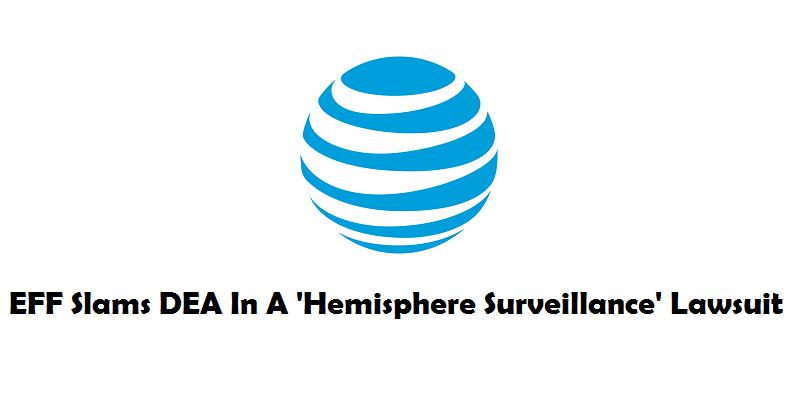The Drug Enforcement Agency is being sued by Electronic Frontier Foundation (EFF) as part of Freedom of Information Act (FOIA) requisition. EFF is accusing the DEA of withholding confidential documents in a court case that would reveal the details about the government’s another surveillance program called as Hemisphere.
Aaron Mackey, the legal fellow at the EFF, responded that the DEA has failed to comply with its FOIA obligations to make public the relevant details regarding the Hemisphere program. EFF believes that DEA has improperly withheld these records.
EFF also said that it has discovered new documents as part of its FOIA lawsuit which exhibits a dismissive attitude by law enforcement agencies over a regular searching of trillions of AT&T subscribers’ phone records.
The documents uncovered shows that the law enforcements themselves calling the Hemisphere surveillance program as ‘Google on steroids’ or ‘super search engine,’ which Mackey said that they were ‘taken aback’ and ‘the law enforcement’s use of Hemisphere has become natural to them.

Hemisphere surveillance is a covert surveillance program that has been used since 2007 but its revelation made in 2013 by investigative reporters at New York Times. The US company AT&T is collaborating with the DEA to provide mass surveillance program and paid for by the White House. The secret program allows DEA to search trillions of AT&T subscribers’ phone records without any legal warrants. Hemisphere phone records include incoming and outgoing calls, geographic locations and call durations.
The civil liberties groups such as EFF and Electronic Privacy Information Center (EPIC) allege Hemisphere for violating First and Fourth Amendments protections of the citizens of the United States against unduly search and freedom of speech. However, DEA did not respond to a request for an interview for this story.
In an update on its legal battle against DEA, co-author Dave Maas investigative researcher and Aaron Mackey wrote, “Hemisphere allows police to see a person’s associations, shedding light on their personal connections and political and social networks … We know that law enforcement officials have subjected Black Lives Matter activists to automated social media monitoring, and subjected attendees at gun shows to surveillance by automated license plate readers. Government officials can easily use Hemisphere in similar ways.”
The EPIC, EFF, and ACLU (American Civil Liberties Union) has expressed their concerns that Hemisphere is extremely invasive in an unconstitutional way. EFF and EPIC have filed a lawsuit against DEA to seek more information on the Hemisphere program, with little success. EFF also has filed an FOIA lawsuit against California Attorney General which is currently pending the federal court’s decision on EFF vs. DEA.
Last month, EFF filed a formal request in Federal Court demanding that the DEA provide records on an immediate basis. However, the DEA according to EFF, explained that they need to protect the identities of informants. In some instances, the government straightforward refused to share documents on the basis that it would undermine the effectiveness national security.
But EFF isn’t relying on the excuses from the government entirely. It argues – in its similar FOIA lawsuit by EPIC against the DEA – that the government was inconsistent about which document were shared with the EPIC and EFF. Mackey said that the DEA is treating the EPIC’s and EFF requisitions differently. Out of 161 long pages common to lawsuits, the government gave twice as many legal reasons to withhold documents from the EFF.
Mackey said, “The government has yet to explain why it treated the exact same information so differently in EFF’s and EPIC’s respective FOIA requests. Absent any explanation, the disparate treatment appears highly arbitrary.”
He said while the EFF naturally respects the government’s need for exemptions, however, we have reason to doubt DEA’s claims due to their inconsistencies and the poor legal arguments to withhold documents.
Share this article
About the Author
Peter Buttler an Infosec Journalist and Tech Reporter, Member of IDG Network. In 2011, he completed Masters in Cybersecurity and technology. He worked for leading security and tech giants as Staff Writer. Currently, he contributes to a number of online publications, including The Next Web, CSO Online, Infosecurity Mag, SC Magazine, Tripwire, GlobalSign CSO Australia, etc. His favorite areas Online Privacy, AI, IoT, VR, Blockchain, Big Data, ML, Fintech, etc. You can follow him on twitter.
More from Peter ButtlerRelated Posts

Passengers’ Data Stored on User Devices, not on DigiYatra Storage, says India Govt
KEY TAKEAWAYS Unblocking streaming content from Amazon Prime is easy only if you know the reliable V...

NCSC Chief: Clear Rules Needed to Prevent Cyberspace Conflict and Struggle
A safe and secure digital world necessitates a clear definition and enforcement of international cyb...

‘Revive’ has been upgraded to a banking Trojan on Android
This month, Cleafy’s security researchers discovered a new Android Banking Trojan in the wild....

Asian Industrial Control Systems Targeted by Hackers Using the Shadowpad Backdoor
Unpatched Microsoft Exchange servers in various Asian countries were the target of an attack campaig...
Data Breaches Could Occur Due to Kubernetes Misconfigurations That Were Leaked.
Over 900,000 Kubernetes (K8s) have been discovered to be vulnerable to malicious scans and/or data-e...

Attacks by Cybercriminals Will Become the Main Threat in 2024. Privacy Issues Tendencies
Internet Privacy is the main Concern today Advertisers track your online activities and interf...


